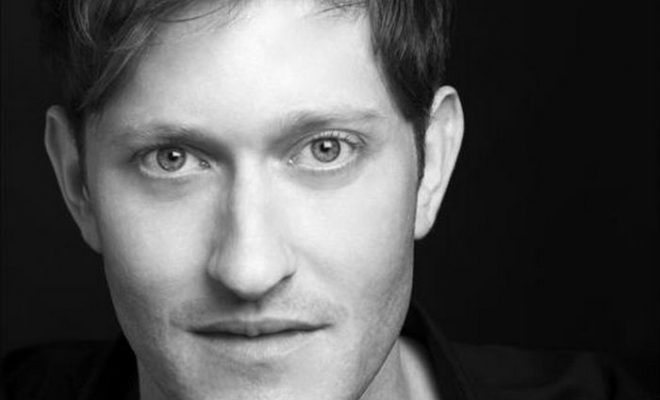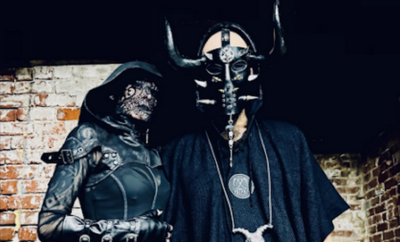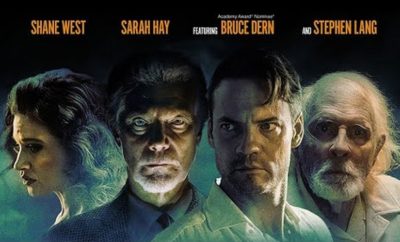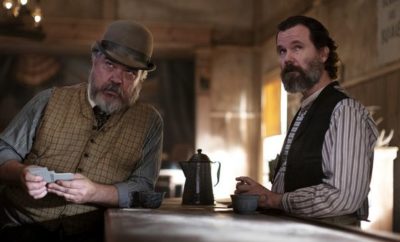
Interviews
Samuel Roukin – TURN: Washington’s Spies
By: Jamie Steinberg
Q) What are the recent projects that you are working on?
A) I have a movie coming out in July called Equity with Anna Gunn. That’s the first female-driven Wall Street movie. I just completed a season on “Salem” for WGN. So, that will be out on Halloween for Season Three.
Q) How did you come to portray Simcoe?
A) It’s a good story actually because that pilot season, “Turn” was like the best script I read and everybody wanted to do it. I was originally up for the role of Major John Andre, which is obviously now played by the amazing JJ Field. Subsequently, they asked if I wanted to play Simcoe instead and I said, “Cool.” In the original pilot, Simcoe was killed and we filmed that. It wasn’t until well after the show got picked up that I got a call from Craig Silverstein and Barry Josephson to tell me that AMC just loved what I was doing with the character and they really wanted Simcoe to be a stronger presence in the show. They were going to rewrite it and reshoot it. So, I was on as a regular from then on. It’s good now because Simcoe actually lives past the war and goes on to do some great things in Canada.
Q) Did they provide you with research or did your own in order to portray Simcoe accurately?
A) The time between being booked for the pilot and doing it there really wasn’t a lot of time to prepare. So, initially, it was kind of a scramble to read some of his memoirs and try to work out who he was. But in the time between the show getting picked up and the beginning of Season One proper I did a lot of research. In England, they teach nothing about the American Revolution. So, I was really coming into it without any prior knowledge and there was a lot to learn. There was a lot to learn about the war in general and Simcoe the man. I went to work on that and read as much as I could. So, I didn’t have any kind of specific help from a specific historian, but luckily there is so much written about him to work from. There are a lot of things you can pick out from the memoirs and what people said about him. In the hiatus, I go back to the history books and read more and research some more. Obviously, there is a point where you have to throw the history books away and do the work that is in the page that we are given from the writers. We’re not dramatizing a history book; we’re doing TV drama. There is a point where you have say, “I trust I know enough to dive into the scripts now.” So, doing the shooting of it I do very little background reading unless we are dealing with a specific historic event that I know nothing about. For instance, at the end of Season Two we did The Battle of Monmouth. It was useful to find out a little bit more about that. Then, just before Season Two, I knew that Simcoe was going to take over the Queen’s Rangers. I’d already read about that, but I made sure I knew as much as I could about that situation and the unit. Everyone is very meticulous in the cast about their research. I think it is crucial that there is a point where you say, “History books down, give me the script.”
Q) Based on research your research, was there anything you added to the character that wasn’t originally scripted for you?
A) Yeah, for example, it’s very clear in his memoirs about his time with the Rangers that he was very meticulous about neatness and cleanliness in the army. In fact, he really believed that the first impression of a soldier is a lasting impression and sets the level of respect for the unit that you are representing. So, all the way through his career he was meticulous about that aspect of being a soldier. I really wanted to make sure that when we were on the show – just from costume perspective and the other soldiers in the unit – that it all looked really in place and neat. Any time when we are on set and there is something that would suggest a little bit of waywardness (if you like) in that aspect, I flag it up and we try to reign it in. We know from several sources about the Rangers and his own memoirs about how he ran his unit that his soldiers were always looking really sharp and were arguably one of the cleaner sections of the British Army at that time. Someone who cares about those sorts of things tells you a little bit about them as a person. So, that becomes useful.
Q) I spoke recently to your co-star Ian Kahn and shared something I learned about George Washington that stated something similar for standards with his Life Guard.
A) It’s important to take care of as many details as you can. Just because they are background doesn’t mean they can sort of be dressing. You want your background to be alive, present and involved in telling the story. As much as you can control that, the better.
Q) What keeps challenging you about your role?
A) It’s mostly a lot of fun, to be honest. I don’t consider my job to be a challenge, necessarily. I get challenged often. We’re challenged, as everybody is, by all sorts of things. I think it is physically grueling to play this part because he is constantly in physical scrapes. So, at the end of each season there is a list of injuries I’ve done to myself during the course of the season. So, it is kind of grueling in that aspect. But I find playing Simcoe a lot of fun. I suppose one of the aspects is that he is a complex human being with sociopathic tendencies. After fourteen hours of that day to day, you kind of have to shake that off. That is an element that exists, but I wouldn’t describe that as a challenge. I would kind of describe that as maintenance. Certainly the horse riding gives you a good old boney bum. I do a lot of horse riding on the show and especially the first week back riding is certainly an interesting walking week. It’s more of a waddle after all the horse riding. [laughs] It’s like the physical stuff really and mentally you just have to sort of take care of your brain. I don’t find it grueling. I love it!
Q) How do you shake off playing such a villainous character?
A) You get into your life. I have got a family. I’ve got two small kids and there is no time for moping in my house. I get home and I’m involved. I’m cooking dinner and running around. I think the key is to wipe your feet on the way into work and wipe your feet on the way out of work. It’s just two separate things and I dive into my life. There is lots of other stuff going on. So, really it’s just focusing on the present. It’s either you are involved in doing that character or you are in your real life and you are not that character. I just make a very clear decision with it.
Q) Is there someone you wish you had gotten to work with more or not worked with at all that you’d like the opportunity?
A) I do think it would be really fun for Washington (Ian Kahn) and Simcoe to be in a room together. I think that would be a pretty interesting dynamic. Other than that, I really wanted to work with Angus Macfadyen’s character because it has been brewing for some time that Simcoe and Rogers were going to face off. I think it is fair to say that the audience won’t be disappointed about that this season.
Q) What have been some of your most memorable moments from filming “Turn?”
A) I’d say the most memorable moment had to be in Season Two. I had to have an emergency surgery during Season Two so I had a couple of weeks of work. I came back and half the day was going to be catching up on what I had not been able to shoot and the other half of the day was going to be the new stuff for the current episode we were filming. It just coincided with my wife being nine months pregnant with our second son. It was a Friday and I said to her, “Just do me a favor…just wait until the weekend.” And she was like, “Mmhm.” We were at work and I got the call that she had gone into labor and I couldn’t’ believe it because it was the first catchup day. Of all the days it could have happened, it was a really bad day for it to happen. Then, lunch time arrived and it was definitely on! I raced from set in a van and got there. An hour later, my son was born.
Q) Were you still in costume?
A) I wasn’t still in costume, but I was still in makeup. My wife kind of looked down at my hands like I was a really gross person, but I assured her it was just paint. So, a couple hours after the baby had been born, my wife noticed I was a little distracted. I plucked up the courage and was about to say something when she said, “You want to go back to work, don’t you?” I said, “Well, I think they would like it. I’ll just call there.” She was like, “Just go back to work. That’s fine. Go back to work.” I did go back to work and they had done a bit of shuffling while I was away and, in fact, we only lost ten minutes from the day and made all of the scenes we were supposed to get. So, we did a morning of shooting, helped with the birth of my son and came back and bayonetted someone through the throat. It was a perfect day at the office!
Q) What do you think it is about the show that has made it a fast fan favorite?
A) Storytelling is a primal need. People love stories that are true. We are telling a true story and throwing light on an aspect of a story that people thought they knew, but don’t know really or don’t know in this way. So, we’re shedding light on the birth of this great country and I think people are always connected to that. To show it in a new way and to show a deeper part of it is one of the reasons it is doing well. The other reason is the characters are just really compelling. Humanizing these historical figures is really exciting because you get to see historical figures that live in history books and don’ts seem like they are human beings. You see them in front of your eyes and suddenly you can relate to them. The idea you can relate to someone like Simcoe, Washington and Benedict Arnold – these people have just been held up sort of like stone statues. To humanize them and realize that they are really just human beings like we are, except in a different context and time, I think that connects us as humans with history in a deeper way and I think that is kind of an irresistible thing for an audience. One of the other reasons the show is so popular is because it is great writing. At the end of the day, cream rises to the top. And great writing will always win over an audience. Always.
Q) You are a part of social media. Why is that such an important way for you to interact with fans?
A) I think it’s great. I really think it is a brilliant tool – social media. Not just because of how you can contact your audience in terms of growing the show. When I was a kid growing up and I had an actor hero or a sports star that was a hero of mine, I’d have to write a fan letter. You’d write it down, put it in an envelope and mail it. You’d never know if it arrived and you’d certainly never know if that person had read it. And now, with social media, people can basically text you! You are getting it on your phone and you can have an immediate interaction with someone you want to talk to. I just think that is a very cool way of being in contact with fans of the show and of your work. And I think it is exciting to see live that people are reacting. It’s like having a live audience in a way. Not that you can change anything, but you get to see what their reaction is right away. Always at the start of the season, before your first episode premieres, we go to screenings and we sit in a theater and watch it with a couple hundred people or more. It’s like going to the movies, but for a TV show. You don’t ever get that for the rest of the season and it’s just so interesting to have a group mentality around the show. I think that’s what social media does in the interim when you are not all in a room together. It’s like you are in a room together because everyone is talking about it and interacting during the commercial breaks. I think it is a great thing and I think otherwise the audience would be invisible with TV. So, things like that are really helpful knowing who your audience is. Being able to contact them and them being able to contact you is exciting.
Q) What would you like to say to everyone who is a fan and supporter of you and the show?
A) You are all very, very clever people! [laughs] No. Obviously, we’re just hugely grateful. We don’t do it for ourselves. We do it because we want the story to get out there to an audience. For us, it’s the whole reason for doing it and it is so exciting. We’re so grateful for our audience. They are very loyal and genuinely they are really smart and they really care about the history and they care about these characters. That’s such a gift for us, making this work. So, I want to say thank you for watching, keep watching and tell all of your friends.





You must be logged in to post a comment Login